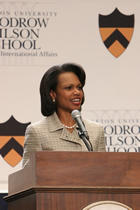Some would argue that this broad approach to the problem is making the world less stable by rocking the boat and wrecking the status quo. But this presumes the existence of a stable status quo that does not threaten global security. This is not the case. A regional order that produced an ideology of hatred so savage as the one we now confront is not serving any civilized interest.
For 60 years, we often thought that we could achieve stability without liberty in the Middle East. And ultimately, we got neither. Now, we must recognize, as we do in every other region of the world, that liberty and democracy are the only guarantees of true stability and lasting security.
There are those who worry that greater freedom of choice in the Middle East will only liberate and empower extremism. In fact, the opposite is true: A political culture of transparency and openness is not one in which extremist beliefs can ultimately thrive. Extremism is most dangerous when it lurks in the dark and hides underground. When there is no political space for individuals to advance their interests and redress their grievances, then they retreat into the shadows to grow ever more radical and divorced from reality. We saw the result of that on September 11th and now we must work to advance democratic reform throughout the greater Middle East.
Bad Hair Blog has the Q&A.
The "stability without liberty" line is the Bush Administration repeating itself. And I don't know that Rice is correct. For example: Franco's Spain, Salazar's Portugal, Pinochet's Chile all moved pretty smoothly from dictatorship, preserving stability while transforming their systems to ones of liberty and democracy. Much of the former USSR and its satellites, ditto. Countries can move from dictatorship to democracy without American military occupation. You can have stability and authoritarianism. That was the Reagan doctrine, to support authoritarians against totalitarians. It worked.
On the other hand, the current situation in Iraq seems to suggest that some American democracy initiatives may not be working as well as Rice believes. There may be more than one way to bring about democratic change, and Bush's "my way or the highway" style might paradoxically be strengthening anti-democratic forces in Russia, China, Iran, and elsewhere. Especially to the degree America appears to be losing.
The Al Qaeda cell that blew up the World Trade Center and Pentagon, as Rice well knows, was based in Germany--a democracy. The plotters also lived and studied in the USA--a democracy. They had support networks in Spain and Italy--both democracies. And in the Phillipines, Indonesia, and Turkey--democracies. Suicide bombers blow up innocents in Israel and Britain-both democracies.
 Some would argue that this broad approach to the problem is making the world less stable by rocking the boat and wrecking the status quo. But this presumes the existence of a stable status quo that does not threaten global security. This is not the case. A regional order that produced an ideology of hatred so savage as the one we now confront is not serving any civilized interest.
Some would argue that this broad approach to the problem is making the world less stable by rocking the boat and wrecking the status quo. But this presumes the existence of a stable status quo that does not threaten global security. This is not the case. A regional order that produced an ideology of hatred so savage as the one we now confront is not serving any civilized interest.